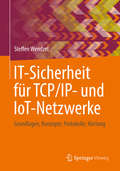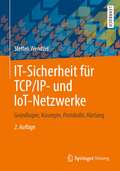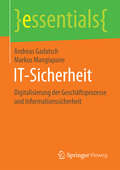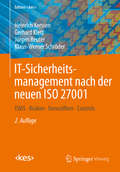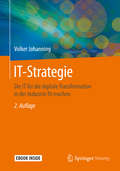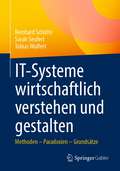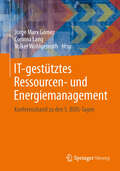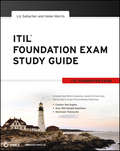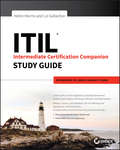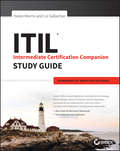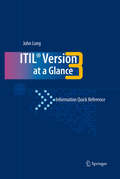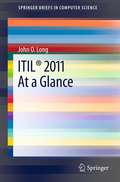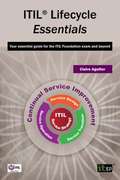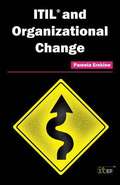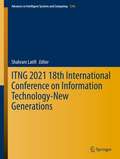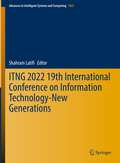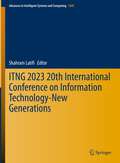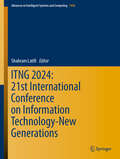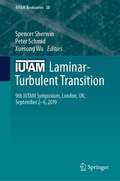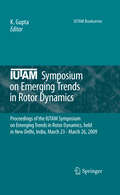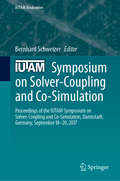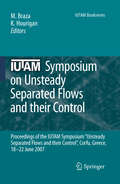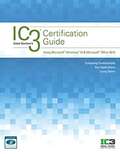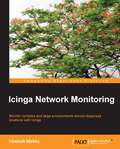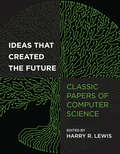- Table View
- List View
IT-Sicherheit für TCP/IP- und IoT-Netzwerke
by Steffen WendzelDie Bedeutung der digitalen Infrastruktur, insbesondere von Netzwerken, ist in den letzten zehn Jahren kontinuierlich gestiegen. Das gilt gleichermaßen für die IT-Sicherheit. Denn ohne sichere Netzwerke können Technologien wie Künstliche Intelligenz oder das Internet der Dinge weder betrieben noch weiterentwickelt werden. Dieses Buch liefert das Fundament, um die Konzeption von TCP/IP- und IoT-Netzwerken und ihre Sicherheit in einer zunehmend vernetzten Welt zu verstehen. Es vereint praxisrelevantes Know-how mit den wissenschaftlichen Grundlagen und aktuellen Forschungsideen zu einem umfassenden Werk. Der Autor legt großen Wert darauf, die Grundlagen der Netzwerktechnik und der IT-Sicherheit verständlich und ausführlich darzustellen. Daneben greift er auch die folgenden Themen auf: · Die Kryptographie, ihre historischen und modernen Verfahren sowie ihre Anwendung beispielsweise in VPNs (Virtual Private Networks) · Die wichtigsten Angriffs- und Verteidigungsmethoden für Netzwerke · Die Sicherheit des Internets der Dinge und sein Einsatz etwa in Smart Buildings und Industriesteueranlagen Das Buch ist so konzipiert, dass Leserinnen und Leser mit einem eher praktischen Zugang zum Thema IT- und Netzwerksicherheit genauso profitieren wie jene mit einem mehr theoretischen Zugang. Durch zahlreiche Übungen – inklusive klassischer Klausuraufgaben – ist es sowohl für die Lehre als auch für das Selbststudium bestens geeignet. Zusatzmaterial wie Vorlesungsunterlagen und selektierte Lösungen zu den Übungen stehen online zum Download zur Verfügung.
IT-Sicherheit für TCP/IP- und IoT-Netzwerke: Grundlagen, Konzepte, Protokolle, Härtung
by Steffen WendzelDie Bedeutung der digitalen Infrastruktur, insbesondere von Netzwerken, ist in den letzten zehn Jahren kontinuierlich gestiegen. Das gilt gleichermaßen für die IT-Sicherheit. Denn ohne sichere Netzwerke können Technologien wie Künstliche Intelligenz oder das Internet der Dinge weder betrieben noch weiterentwickelt werden. Dieses Buch liefert das Fundament, um die Konzeption von TCP/IP- und IoT-Netzwerken und ihre Sicherheit in einer zunehmend vernetzten Welt zu verstehen. Es vereint praxisrelevantes Know-how mit den wissenschaftlichen Grundlagen und aktuellen Forschungsideen zu einem umfassenden Werk. Der Autor legt großen Wert darauf, die Grundlagen der Netzwerktechnik und der IT-Sicherheit verständlich und ausführlich darzustellen. Daneben greift er auch die folgenden Themen auf: Die Kryptographie, ihre historischen und modernen Verfahren sowie ihre Anwendung beispielsweise in VPNs (Virtual Private Networks)Aktuelle Angriffs- und Verteidigungsmethoden für NetzwerkeSteganografie in modernen NetzwerkenDie Sicherheit des Internets der Dinge und sein Einsatz etwa in Smart Buildings und Industriesteueranlagen Das Buch ist so konzipiert, dass Leserinnen und Leser mit einem eher praktischen Zugang zum Thema IT- und Netzwerksicherheit genauso profitieren wie jene mit einem mehr theoretischen Zugang. Durch zahlreiche Übungen – inklusive klassischer Klausuraufgaben – ist es sowohl für die Lehre als auch für das Selbststudium bestens geeignet. Zusatzmaterial wie Vorlesungsunterlagen und selektierte Lösungen zu den Übungen sind im Buch enthalten.
IT-Sicherheit: Digitalisierung der Geschäftsprozesse und Informationssicherheit (essentials)
by Andreas Gadatsch Markus MangiapaneAndreas Gadatsch und Markus Mangiapane erl#65533;utern zentrale Aspekte der Digitalisierung und der IT-Sicherheit, ohne die digitale Gesch#65533;ftsmodelle und -prozesse nicht realisierbar sind. Die Autoren m#65533;chten den Leser f#65533;r aktuelle Trends im Informationsmanagement und deren Auswirkungen auf IT-Sicherheit sensibilisieren. Wenn man von jedem Punkt der Welt aus einen Prozess nutzen kann, so kann man ihm auch jederzeit von jedem Ort aus schaden, ihn stoppen, ver#65533;ndern oder Daten manipulieren. IT-Sicherheit ist daher die Grundlage zur Realisierung digitaler Prozesse.
IT-Sicherheitsmanagement nach der neuen ISO 27001: ISMS, Risiken, Kennziffern, Controls (Edition <kes>)
by Heinrich Kersten Gerhard Klett Jürgen Reuter Klaus-Werner SchröderDieses Buch behandelt das Management der Informationssicherheit auf der Basis der Norm ISO/IEC 27001. Mit der 2. Auflage wurden die Inhalte des Fachbuches umfassend aktualisiert und den Neuerungen der Norm angepasst. Die Autoren erläutern kompetent den Standard und seine organisatorisch-technische Umsetzung. Dies betrifft die Anforderungen an das Informationssicherheits-Managementsystem (ISMS) genauso wie die 114 Controls aus dem Anhang der Norm. Die ausführlich kommentierten Controls unterstützen Sicherheitsverantwortliche bei der Auswahl geeigneter Sicherheitsmaßnahmen in allen Bereichen.Die Normenreihe ISO 27000 ist ein wichtiges Hilfsmittel für Unternehmen und Behörden, die ein IT-Sicherheitsmanagement in ihrer Organisation einführen und betreiben wollen. Im internationalen Kontext ist die Anwendung der ISO 27001 für viele Organisationen nahezu unverzichtbar. Nicht zuletzt mit dem deutschen IT-Sicherheitsgesetz erhält dieser Standard auch national eine hohe Bedeutung. Seit der Neufassung der Norm im Jahr 2015 (deutsche Version) und Änderungen in 2017 müssen sich alle Organisationen entsprechend umstellen und ihr ISMS anpassen. Hierfür enthält das Buch entsprechende „Fahrpläne“.
IT-Strategie: Die IT für die digitale Transformation in der Industrie fit machen
by Volker JohanningErstellen Sie mit diesem Buch eine IT-Strategie für Ihr UnternehmenIn sieben aufeinander aufbauenden Schritten präsentiert dieses Buch die Entwicklung einer IT-Strategie für produzierende Unternehmen mit der Möglichkeit der praktischen Umsetzung anhand von vorgefertigten Arbeitsblättern. Dabei betrachtet es alle für eine IT-Strategie relevanten Themenkomplexe, von der Ableitung der IT-Strategie aus der Unternehmensstrategie bis zur Erstellung der Applikations- und Sourcingstrategie. Die Rolle der IT im Unternehmen und die Rolle des CIOs werden eingehend beleuchtet und als Aufbauorganisation wird das Demand/Supply-Modell ausführlich vorgestellt. Der Leser erfährt in diesem Buch, wie er die IT-Strategie in eine Roadmap zur Umsetzung überführt, ein Portfolio zur Steuerung der Projekte nutzt und mit einem eigens entwickelten IT-Strategiecockpit die Ziele der IT-Strategie umsetzen und kontrollieren kann. Die zweite Auflage berücksichtigt verstärkt die DigitalisierungDiese zweite Auflage setzt den Fokus auf produzierende Unternehmen, um dem Branchenfokus einer jeden IT-Strategie Rechnung zu tragen. Sie betrachtet außerdem die Abgrenzung zu Digitalisierung und Digitalisierungsstrategien und enthält zusätzliche Erläuterungen zu agilen Methoden, DevOps sowie bi-modalen IT-Strukturen. Damit ist das bestehende 7-Schritte-Konzept zur Entwicklung einer IT-Strategie fokussierter geworden und hat sich der aktuellen Themen der sich weiterhin rasant entwickelnden IT und Digitalisierung angenommen.Inhaltlich konzentriert sich das Buch über die Erstellung von IT-Strategien auf die folgenden Bereiche:· Grundlegendes zur IT-Strategie sowie Abgrenzung zu einer Digitalisierungsstrategie· Gründe für eine IT-Strategie· Ist-Analyse der IT· Analyse der Unternehmensstrategie· IT-Applikationsstrategie· Sourcing-Strategie· IT-Organisation und IT-Governance· Praxis-Umsetzung: Budgetierung, IT-Roadmap und IT-Projektportfolio· Monitoring und Kontrolle der IT-Strategie mit dem IT-Strategiecockpit Der Autor richtet sich vor allem an CIOs und IT-Leiter von mittelgroßen bis großen Unternehmen und Konzernen der produzierenden Industrie. Darüber hinaus ist das Buch für die folgenden Zielgruppen geeignet:· Mitarbeiter von IT-Stabsabteilung, IT-Controlling und IT-Führungsebene· IT-Management-Berater· CFOs, CEOs, Geschäftsführer und Vorstände von produzierenden Unternehmen
IT-Systeme wirtschaftlich verstehen und gestalten: Methoden – Paradoxien – Grundsätze
by Reinhard Schütte Sarah Seufert Tobias WulfertDer Einsatz von IT-Systemen ist omnipräsent. Im Gegensatz zur Verbreitung der Systeme werden die Wirkungen der Systeme für Individuen, Unternehmen oder Gesellschaften selten betrachtet. Damit dürften viele Nutzer und Unternehmen von der Wirkung der Investition überrascht werden. Die Gefahr fehlerhafter Investitionen nimmt zu und mögliche Potenziale der IT bleiben ungenutzt. Das Buch vermittelt wissenschaftlich fundiertes Wissen über die Wirkung und Wirtschaftlichkeit von IT-Systemen. Aufbauend auf Grundlagen aus der Organisationslehre, Soziologie, Entscheidungstheorie, Kosten- und Leistungsrechnung wird diskutiert, welche Phänomene durch IT-Systeme induziert werden. Die mannigfaltigen Wirkungen von IT-Systemen sowie Verfahren zur Wirkungsermittlung werden beschrieben. Sämtliche Aspekte für ein holistisches Wirkungsmanagement von IT-Systemen von der Projektskizze bis zur Umsetzung in der Realität werden in einem neuen Ansatz integriert.
IT-gestütztes Ressourcen- und Energiemanagement: Konferenzband zu den 5. BUIS-Tagen
by Jorge Marx Gómez Volker Wohlgemuth Corinna LangIn diesem Tagungsband zu den 5. BUIS-Tagen (15. Tagung der Fachgruppe Betriebliche Umweltinformationssysteme der Gesellschaft für Informatik e.V.) werden aktuelle Themen des IT-gestützte Ressourcen- und Energiemanagements präsentiert mit dem Fokus auf: Green IT und Energieeffizienz, Stoffstrommanagement, Green Production, Green Logistics, Nachhaltigkeitsmanagement und Kommunikation, Green Software sowie Materialeffizienz und Recycling. In der "Students Corner" präsentieren Studierende eigene Lösungsansätze aus Projekten und Abschlußarbeiten.
ITIL Foundation Exam Study Guide
by Helen Morris Liz GallacherEverything you need to prepare for the ITIL exam - Accredited to 2011 syllabusThe ITIL (Information Technology Infrastructure Library) exam is the ultimate certification for IT service management. This essential resource is a complete guide to preparing for the ITIL Foundation exam and includes everything you need for success. Organized around the ITIL Foundation (2011) syllabus, the study guide addresses the ITIL Service Lifecycles, the ITIL processes, roles, and functions, and also thoroughly explains how the Service Lifecycle provides effective and efficient IT services.Offers an introduction to IT service management and ITIL V3 service strategyHighlights the topics of service design and development and the service management processesReviews the building, testing, authorizing, documenting, and implementation of new and changed services into operationAddresses creating and maintaining value for customers through monitoring and improving services, processes, and technologyDownload valuable study tools including practice exams, flashcards, a glossary of key terms and more.If you prefer self-study over the more expensive training course, but you don't want to skimp on information or preparation, then this study guide is for you.
ITIL Intermediate Certification Companion Study Guide: Intermediate ITIL Service Capability Exams
by Helen Morris Liz GallacherThe expert-led, full-coverage supporting guide for all four ITIL exams ITIL Intermediate Certification Companion Study Guide is your ultimate support system for the Intermediate ITIL Service Capability exams. Written by Service Management and ITIL framework experts, this book gives you everything you need to pass, including full coverage of all objectives for all four exams. Clear, concise explanations walk you through the process areas, concepts, and terms you need to know, and real-life examples show you how they are applied by professionals in the field every day. Although this guide is designed for exam preparation, it doesn't stop there — you also get expert insight on major topics in the field. The discussion includes operational support and analysis; planning, protection and optimization; release, control and validation; and service offerings and agreements that you'll need to know for the job. ITIL is the most widely-adopted IT Service Management qualification in the world, providing a practical, no-nonsense framework for identifying, planning, delivering, and supporting IT services to businesses. This book is your ideal companion for exam preparation, with comprehensive coverage and detailed information. Learn service strategy principles, organization, and implementation Master the central technologies used in IT Service Management Be aware of inherent challenges, risks, and critical success factors Internalize the material covered on all four ITIL exams The ITIL qualification is recognized around the globe, and is seen as the de facto certification for those seeking IT Service Management positions. Passing these exams requires thorough preparation and rigorous self-study, but the reward is a qualification that can follow you anywhere. ITIL Intermediate Certification Companion Study Guide for the ITIL Service Capability Exams leads you from Foundation to Master, giving you everything you need for exam success.
ITIL Intermediate Certification Companion Study Guide: Intermediate ITIL Service Lifecycle Exams
by Helen Morris Liz GallacherComplete, detailed preparation for the Intermediate ITIL Service Lifecycle examsITIL Intermediate Certification Companion Study Guide is the ultimate supporting guide to the ITIL Service Lifecycle syllabus, with full coverage of all Intermediate ITIL Service Lifecycle exam objectives for Service Operation, Service Design, Service Transition, Continual Service Improvement, and Service Strategy. Using clear and concise language, this useful companion guides you through each Lifecycle module and each of the process areas, helping you understand the concepts that underlie each skill required for certification. Illustrative examples demonstrate how these skills are applied in real-life scenarios, helping you realize the importance of what you're learning each step of the way. Additional coverage includes service strategy principles and processes, governance, organization, implementation, and technology considerations, plus guidance toward common challenges and risks. ITIL is the most widely adopted approach for IT Service Management in the world, providing a practical, no-nonsense framework for identifying, planning, delivering, and supporting IT services to businesses. This study guide is the ultimate companion for certification candidates, giving you everything you need to know in a single informative volume. Review the information needed for all five Lifecycle exams Examine real-life examples of how these concepts are applied Gain a deeper understanding of each of the process areas Learn more about governance, organization, implementation, and more The Intermediate ITIL Service Lifecycle exams expect you to demonstrate thorough knowledge of the concepts, processes, and functions related to the modules. The certification is recognized around the world as the de facto standard for IT Service Management, and the skills it requires increase your value to any business. For complete, detailed exam preparation, ITIL Certification Companion Study Guide for the Intermediate ITIL Service Lifecycle Exams is an invaluably effective tool.
ITIL Version 3 at a Glance
by John O. LongITIL® Version 3 At a Glance takes a graphical approach to consolidating the information of ITIL® version 3. ITIL® is an internationally-recognized set of best practices for providing IT service management. IT organizations worldwide are implementing ITIL® as a vehicle for improving IT service quality and improve return on investment for IT services. The desk reference's unique graphical approach takes otherwise complex textual descriptions and makes the information accessible in a series of consistent, simple diagrams. ITIL® Version 3 At a Glance will be of interest to organizations looking to train their staffs in a consistent and cost-effective way. Further, this book is ideal for anyone involved in planning consulting, implementing, or testing an ITIL® Version 3 implementation.
ITIL® 2011 At a Glance
by John O. Long"ITIL® 2011 At a Glance" is an important update to the internationally-recognized ITIL® best practices for IT Service Management. "ITIL® 2011 At a Glance" provides graphical and textual memory joggers for the primary concepts of those best practices. IT organizations worldwide are implementing ITIL® as a vehicle for improving IT service quality and improve return on investment for IT services. This book is an update based on the ITIL 2011 Update. The desk reference's unique graphical approach will take otherwise complex textual descriptions and make the information accessible in a series of consistent, simple diagrams. "ITIL® 2011 At a Glance" will be of interest to organizations looking to train their staffs in a consistent and cost-effective way. Further, this book is ideal for anyone involved in planning consulting, implementing, or testing an ITIL® implementation.
ITIL® Lifecycle Essentials
by Claire AgutterTaking you through the ITIL Foundation exam and beyond. ITIL is the best practice methodology for IT Service Management, developed by the UK government and globally adopted in both the public and private sectors. ITIL Lifecycle Essentials covers all of the vital material required for the entry-level ITIL Foundation Certificate, which gives candidates a comprehensive overview of the key elements, concepts and terminology used in the ITIL service lifecycle. The essential link between your ITIL qualification and the real-world. More than just a guide to help you pass an exam, this book also provides practical guidance for when newly qualified practitioners enter the real-world. By addressing processes and concepts not covered in the syllabus, this book guides practitioners as they go beyond Foundation level. It features practical tips on using service management, and for each process the author adds to the theory with lessons from her own real-world experience. ITIL Lifecycle Essentials is ideal for self-study candidates, training delegates and V2 Foundation Certificate holders who have not yet taken the upgraded exam. Project managers looking to broaden their qualifications will find it a helpful companion to their studies and a practical aid for their professional development. Contractors or consultants with limited study time will also find this book essential to their part-time education. A perfect companion before, during and after your ITIL education. Claire Agutter has held a number of operational, consulting and implementation roles, giving her real-world, practical experience of ITIL. Since 2007 she has been an ITIL principal lecturer and has been involved in exam panels for ITIL V2 and V3. She has also provided online ITIL training to hundreds of successful Foundation delegates.
ITIL® and Organizational Change
by Pamela ErskineOrganizational change is difficult to manage and takes time to implement. How it is managed has a direct impact on its success. The implementation of ITIL can be particularly challenging, especially for organizations for whom it represents a radical change. So how do you ensure that the process goes smoothly and offers a return on your investment? In ITIL® and Organizational Change, Pamela Erskine analyzes some of the reasons why organizations fail to realize the benefits of ITIL and offers practical ways to avoid these pitfalls. She examines ways to clear the many hurdles that can obstruct progress and investigates how to improve acceptance of change in the workplace. Drawing on her many years of experience, Pamela discusses five different models of organizational change and explains how to select the most suitable approach for your project and your organization. Real-life examples bring the theories to life.
ITNG 2021 18th International Conference on Information Technology-New Generations (Advances in Intelligent Systems and Computing #1346)
by Shahram LatifiThis volume represents the 18th International Conference on Information Technology - New Generations (ITNG), 2021. ITNG is an annual event focusing on state of the art technologies pertaining to digital information and communications. The applications of advanced information technology to such domains as astronomy, biology, education, geosciences, security, and health care are the among topics of relevance to ITNG. Visionary ideas, theoretical and experimental results, as well as prototypes, designs, and tools that help the information readily flow to the user are of special interest. Machine Learning, Robotics, High Performance Computing, and Innovative Methods of Computing are examples of related topics. The conference features keynote speakers, a best student award, poster award, service award, a technical open panel, and workshops/exhibits from industry, government and academia. This publication is unique as it captures modern trends in IT with a balance of theoretical and experimental work. Most other work focus either on theoretical or experimental, but not both. Accordingly, we do not know of any competitive literature.
ITNG 2022 19th International Conference on Information Technology-New Generations (Advances in Intelligent Systems and Computing #1421)
by Shahram LatifiThis volume represents the 19th International Conference on Information Technology - New Generations (ITNG), 2022. ITNG is an annual event focusing on state of the art technologies pertaining to digital information and communications. The applications of advanced information technology to such domains as astronomy, biology, education, geosciences, security, and health care are the among topics of relevance to ITNG. Visionary ideas, theoretical and experimental results, as well as prototypes, designs, and tools that help the information readily flow to the user are of special interest. Machine Learning, Robotics, High Performance Computing, and Innovative Methods of Computing are examples of related topics. The conference features keynote speakers, a best student award, poster award, and service award. . This publication is unique as it captures modern trends in IT with a balance of theoretical and experimental work. Most other work focus either on theoretical or experimental, but not both. Accordingly, we do not know of any competitive literature.
ITNG 2023 20th International Conference on Information Technology-New Generations (Advances in Intelligent Systems and Computing #1445)
by Shahram LatifiThis volume represents the 20th International Conference on Information Technology - New Generations (ITNG), 2023. ITNG is an annual event focusing on state of the art technologies pertaining to digital information and communications. The applications of advanced information technology to such domains as astronomy, biology, education, geosciences, security, and health care are the among topics of relevance to ITNG. Visionary ideas, theoretical and experimental results, as well as prototypes, designs, and tools that help the information readily flow to the user are of special interest. Machine Learning, Robotics, High Performance Computing, and Innovative Methods of Computing are examples of related topics. The conference features keynote speakers, a best student award, poster award, service award, a technical open panel, and workshops/exhibits from industry, government and academia. This publication is unique as it captures modern trends in IT with a balance of theoretical and experimental work. Most other work focus either on theoretical or experimental, but not both. Accordingly, we do not know of any competitive literature.
ITNG 2024: 21st International Conference on Information Technology-New Generations (Advances in Intelligent Systems and Computing #1456)
by Shahram LatifiThis volume represents the 21st International Conference on Information Technology - New Generations (ITNG), 2024. ITNG is an annual event focusing on state of the art technologies pertaining to digital information and communications. The applications of advanced information technology to such domains as astronomy, biology, education, geosciences, security, and health care are the among topics of relevance to ITNG. Visionary ideas, theoretical and experimental results, as well as prototypes, designs, and tools that help the information readily flow to the user are of special interest. Machine Learning, Robotics, High Performance Computing, and Innovative Methods of Computing are examples of related topics. The conference features keynote speakers, a best student award, poster award, service award, a technical open panel, and workshops/exhibits from industry, government and academia. This publication is unique as it captures modern trends in IT with a balance of theoretical and experimental work. Most other work focus either on theoretical or experimental, but not both. Accordingly, we do not know of any competitive literature.
IUTAM Laminar-Turbulent Transition: 9th IUTAM Symposium, London, UK, September 2–6, 2019 (IUTAM Bookseries #38)
by Peter Schmid Spencer Sherwin Xuesong WuThis volume comprises the carefully revised papers of the 9th IUTAM Symposium on Laminar-Turbulent Transition, held at the Imperial College, London, UK, in September 2019. The papers focus on the leading research in understanding transition to turbulence, which is a challenging topic of fluid mechanics and arises in many modern technologies as well as in nature. The proceedings are of interest for researchers in fluid mechanics and industry who have to handle these types of problems, such as in the aeronautical sector.
IUTAM Symposium on Emerging Trends in Rotor Dynamics
by K. GuptaRotor dynamics is an important branch of dynamics that deals with behavior of rotating machines ranging from very large systems like power plant rotors, for example, a turbogenerator, to very small systems like a tiny dentist's drill, with a variety of rotors such as pumps, compressors, steam/gas turbines, motors, turbopumps etc. as used for example in process industry, falling in between. The speeds of these rotors vary in a large range, from a few hundred RPM to more than a hundred thousand RPM. Complex systems of rotating shafts depending upon their specific requirements, are supported on different types of bearings. There are rolling element bearings, various kinds of fluid film bearings, foil and gas bearings, magnetic bearings, to name but a few. The present day rotors are much lighter, handle a large amount of energy and fluid mass, operate at much higher speeds, and therefore are most susceptible to vibration and instability problems. This have given rise to several interesting physical phenomena, some of which are fairly well understood today, while some are still the subject of continued investigation. Research in rotor dynamics started more than one hundred years ago. The progress of the research in the early years was slow. However, with the availability of larger computing power and versatile measurement technologies, research in all aspects of rotor dynamics has accelerated over the past decades. The demand from industry for light weight, high performance and reliable rotor-bearing systems is the driving force for research, and new developments in the field of rotor dynamics. The symposium proceedings contain papers on various important aspects of rotor dynamics such as, modeling, analytical, computational and experimental methods, developments in bearings, dampers, seals including magnetic bearings, rub, impact and foundation effects, turbomachine blades, active and passive vibration control strategies including control of instabilities, nonlinear and parametric effects, fault diagnostics and condition monitoring, and cracked rotors. This volume is of immense value to teachers, researchers in educational institutes, scientists, researchers in R&D laboratories and practising engineers in industry.
IUTAM Symposium on Solver-Coupling and Co-Simulation: Proceedings of the IUTAM Symposium on Solver-Coupling and Co-Simulation, Darmstadt, Germany, September 18-20, 2017 (IUTAM Bookseries #35)
by Bernhard SchweizerThis is the Proceedings of the IUTAM Symposium on Solver Coupling and Co-Simulation that was held in Darmstadt, Germany, September 18-20, 2017. The symposium focused on recent advances in the development of numerical methods for solver coupling, like new explicit, implicit and semi-implicit co-simulation methods, new approaches for realizing variable communication-time grids, and advances in the stability and convergence analysis of solver coupling methods.Recent developments in the practical application of co-simulation methods, for instance new fields of application for solver coupling approaches, new developments in the parallelization of dynamic models with co-simulation techniques, and standardization of co-simulation interfaces, i.e. standardization of data and model exchange were also discussed.The book brings together the research results of leading scientists in applied mathematics, mechanics, and engineering science, thus contributing to further develop numerical methods for coupled simulations.
IUTAM Symposium on Unsteady Separated Flows and their Control
by Marianna Braza K. HouriganUnsteady separated flows are an important topic in theoretical and applied mechanics. The IUTAM Symposium held in Corfu in 2007 (and following on from a previous meeting in Toulouse in 2002) aimed at achieving a unified approach which will regroup the knowledge coming from theoretical, experimental, numerical simulation, modeling and flow-control aspects of separated unsteady flows with respect to incompressible and compressible flow regimes. Topics addressed include physical aspects of the dynamics related to unsteady separation in incompressible flows and flows under compressibility effects, and the state of the art methods for modeling these kinds of flows in high Reynolds numbers. Special attention is paid to control theory and applications, especially including feed-back effects for the attenuation of unsteadiness and of flow separation. The understanding of the flow-physics and their efficient turbulence modeling remains a serious problem in a number of engineering applications, including Aeronautics and Aeroelasticity. Furthermore, the study of advanced flow modeling techniques, especially to control high-Reynolds number transitional and turbulent flows involving unsteady separation, is a crucial need in the above-mentioned domains of fundamental and applied research nowadays.
Ic3 Certification Guide Using Microsoft Windows 10 And Microsoft Office 2016
by Cci LearningPrepare for success with IC3 (Internet and Computing Core Certification) as you master the basic requirements for all three IC3 certification exams: Computing Fundamentals, Key Applications, and Living Online. IC3 CERTIFICATION GUIDE USING MICROSOFT WINDOWS 10 & MICROSOFT OFFICE 2016 offers the IC3 global training and certification preparation to help you earn globally accepted, validated credentials and prove to employers, customers or higher education institutions that you have the computer skills necessary to succeed in today�s digital world. This book emphasizes key knowledge and timely skills for proficiency in using computer technology, ranging from basic hardware and software to operating systems, applications, and the Internet. Comprehensive instruction, lesson objectives, hands-on lab exercises, and specific computer terms help you build the skills you need to advance your career through additional computer certifications, including CompTIA�s A+ and similar exams.
Icinga Network Monitoring
by Viranch MehtaThis book is written in a concise and easy-to-follow approach, it will guide you to get you started with Icinga and lead you through the difficult concepts with illustrated examples and screenshots.If you are a system administrator or Linux enthusiast who is looking for a flexible tool to monitor network infrastructure efficiently, or trying to understand the Icinga software, this is a great book for you. You are expected to have solid foundation in Linux.
Ideas That Created the Future: Classic Papers of Computer Science
by Harry R. LewisClassic papers by thinkers ranging from from Aristotle and Leibniz to Norbert Wiener and Gordon Moore that chart the evolution of computer science.Ideas That Created the Future collects forty-six classic papers in computer science that map the evolution of the field. It covers all aspects of computer science: theory and practice, architectures and algorithms, and logic and software systems, with an emphasis on the period of 1936-1980 but also including important early work. Offering papers by thinkers ranging from Aristotle and Leibniz to Alan Turing and Nobert Wiener, the book documents the discoveries and inventions that created today's digital world. Each paper is accompanied by a brief essay by Harry Lewis, the volume's editor, offering historical and intellectual context.
